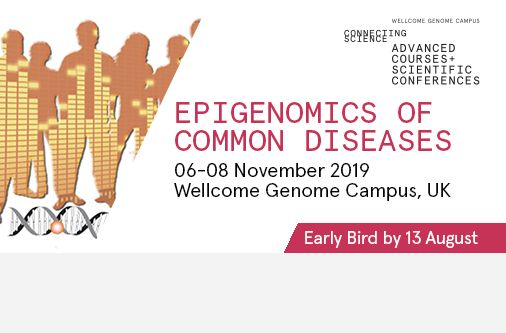

Epigenomics of Common Diseases
November 6, 2019 - November 8, 2019
Discussing the future of epigenomic studies of common diseases
We are pleased to announce the 8th Epigenomics of Common Diseases conference and invite scientists working on experimental and computational epigenomics and epigenetics to showcase the latest developments in the field and discuss epigenomic approaches in common human diseases.
Epigenetic variation plays an important role in disease processes and provides a promising focus for disease prediction, prevention and treatment. Technological advancements in the past few years have fuelled a dramatic increase in the scale, breadth and availability of epigenomic reference maps, including populational and environmental epigenomic datasets.
This year’s conference will cover a broad spectrum of epigenomic discoveries, opportunities, and also challenges, in human normal biology and in disease.
Programme:
The conference will start at 12.30 on Wednesday, 6 November and close at 14.00 on Friday, 8 November 2019.
Topics will include:
- Genetic-epigenetic interactions
- Old and new roles of epigenomic factors
- Epigenomics in development and ageing
- Epigenomic misregulation in cancer, brain and other diseases
- Populational and environmental epigenomics
- Methodological challenges: epigenomic study design, data analysis and interpretation
- The future of epigenomic studies of common diseases
Keynote speakers
Cheryl Arrowsmith – University of Toronto, Canada
John Stamatoyannopoulos – University of Washington, USA
Confirmed speakers
Deborah Bourc’his – Institut Curie, France
Joseph Costello – UC San Francisco, USA
John Greally – Albert Einstein College of Medicine, USA
Eilis Hannon – University of Exeter, UK
Kristian Helin – Sloan Kettering Institute, USA
Eva Jablonka – Tel Aviv University, Israel
Viviane Labrie – Van Andel Institute, USA
Stephanie London – NIEHS, USA
Mathieu Lupien – University of Toronto, Canada
Raphäel Margueron – Institut Curie, France
Kyung-Min Noh – EMBL, Germany
Vardhman Rakyan – Queen Mary University of London, UK
Claire Rougeulle – CNRS / Université Paris Diderot, France
Richard Saffery – Murdoch Children’s Research Institute, Australia
